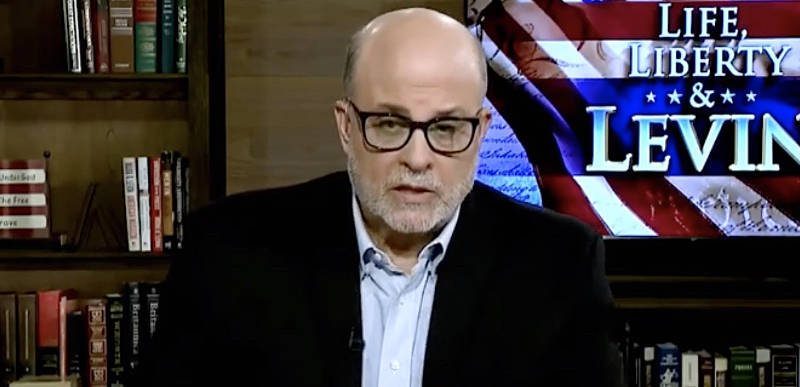Mark Levin argues that a president can pardon himself from state convictions because of the Constitution’s supremacy clause. He’ll explain it more in his refutation, so I’ll let you read it there.
But in Newsweek’s article about it, Turley disagreed with Levin:
His comments come in opposition to the view of other legal scholars like Jonathan Turley, who say presidential pardoning powers do not extend to state convictions.
“This novel argument runs against the federalism grain of the Constitution,” Turley told Newsweek about Levin’s argument, noting that “The text and history of the pardon clause strongly militate against such interpretation extending the federal authority to state crimes.”
Although he disagreed with Levin’s view of pardoning powers, Turley added that there could be other “countervailing constitutional considerations” that could be weighed by federal courts.
Levin responded to this on Twitter, explaining in detail why he takes this position.
Instead of posting the tweet, I’m just going to post his full argument from the tweet below:
Respectfully, Jonathan Turley is simply wrong.
The Constitution is silent on whether you can indict a sitting president or whether a president can pardon himself, even for federal offenses. I challenge Jonathan to demonstrate otherwise. Moreover, the argument that a president cannot be indicted is based on practicality and rationality, nothing more and nothing less. That is the position of the Justice Department under attorneys’ general of both parties — first in a 1973 memorandum by the Office of Legal Counsel (under the Nixon administration), and subsequently endorsed by a second memorandum by OLC in 2000 (under the Clinton administration). The position taken is that you cannot have the executive branch decapitated or crippled by a president who is having to spend an enormous amount of time defending his freedom; that we cannot have an elected president who is convicted running the executive branch from prison; and, of course, the impact on foreign policy and national security could be disastrous.
The idea, as Jonathan seems to argue, without any constitutional bases (his reference to federalism in this context is utterly irrelevant), does not address the problems raised by the DOJ decades ago. This has nothing to do with the general pardon power where a president does not reach into state affairs and pardon individuals for charges and convictions based on state law violations. This involves a sitting president, elected by the voters to serve as president, who serves at the top of the executive branch. The rational argument must be that local and state prosecutors have no more ability to decapitate or cripple the federal executive branch and a president than do federal prosecutors, under the argument set forth by DOJ. Although they don’t address state charges, the reasons a president can pardon himself when faced with federal indictments are exactly the same when it comes to state charges. And it is those reasons that the DOJ has taken the position is has. In fact, since there are literally thousands of local and state prosecutors, the argument is even more compelling when applied to non-federal prosecutors. Can one imagine the mayhem that would result from local or state prosecutors free to act as Jonathan suggests they can? This is among the reasons why the actions in NY and Georgia by local Democrat DAs are so disastrous to the nation, apart from the abuse of grand juries and the law.
There is nothing novel about what I am saying, any more than it is novel to argue that a president can pardon himself from federal indictments. As I said, the Constitution does not address the indictment or pardon issue in that context. Nonetheless, I take into account what the official DOJ position has been for over half a century respecting the impact an indictment would have on the ability of a president to defend himself and run the country. I agree with that view. But it is not based on some hidden language in the Constitution. It is based on practical consequences. Jonathan’s view is not based on the Constitution. Nor is his reference to the history of the pardon power and federalism. They are literally irrelevant. I contend that Jonathan’s view, when you really think about it, is or at least would be the outlier. But since no president has been in a position to have pardoned himself, the issue is who has the better argument not whether one position or another is novel. And the reason we are here is because the Biden DOJ and Democrats DAs have brought us here.

